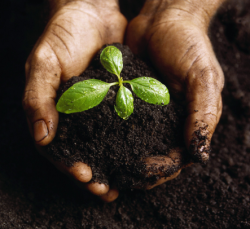By Barbara Perry Lawton
 A big garden trend in recent years is organic gardening. Yet the term organic gardening covers a wide range of practices. The most restrictive definition comes from the USDA’s Agricultural Marketing Service, which implemented a National Organic Program in 2002.
A big garden trend in recent years is organic gardening. Yet the term organic gardening covers a wide range of practices. The most restrictive definition comes from the USDA’s Agricultural Marketing Service, which implemented a National Organic Program in 2002.
The aim of the program is to provide consumer assurance as it supports organic farmers and processors. The steps required to become a certified organic operation include following national organic standards, keeping records of practices and materials used, and having an annual inspection. A three-year transition period is required unless records prove that no prohibited substances were used in or near the production area during the previous three years.
Organic Gardening
Although they could not fulfill the USDA requirements for organic gardening certification, many gardeners are conscientiously trying to garden in what they consider safe and healthful ways. They won’t use any potentially harmful products – chemicals, preservatives, etc. – in their gardening practices. Common sense and environmental concerns are at the heart of their philosophy. They compost and use green manuring techniques. They work at improving soil texture and composition through organic soil amendments, including grass clippings, animal manures, leaves and so forth.
Natural Gardening
Natural gardening is a looser definition that is also called organic gardening by some. These gardeners have a similar basic philosophy to those in the above group but they aren’t as strict in their choices of soil amendments. They will use natural products that are basically organic even if they contain a minimum of preservatives, dyes, etc. Natural soil amendments include such materials as blood meal, bone meal, fish emulsion, kelp spray, and cottonseed meal.
Permaculture and Sustainable Gardening
These terms refer to those growers and gardeners who practice a form of organic gardening that calls for only using materials from their own farms or gardens to recycle by composting and using to improve the soil. They make compost, fertilizers and soil amendments themselves. They will not buy or get organic materials from outside or commercial sources.
Where Does That Leave Most of Us?
Most of us with strong interests in organic gardening practice a combination of things and seem to be heading more toward more strictly organic methods each year. We have learned that healthy soil produces healthy plants. We are learning to substitute compost and low-till practices for deep digging and chemical additives.
We no longer use pesticides, except in extreme cases, preferring to treat harmful insect problems with low impact solution such as sprays of cold water and hand picking. Most of us find that hand weeding and mulching now substitute successfully for herbicides. We are learning that healthy soil life – earth worms and all the many other kinds of soil life – will go far in helping produce vigorous plant life. At the same time, we are learning that excessive soil disruption and chemical fertilizers do not support and encourage healthy soil life – instead, they will destroy it.
Finally
The pluses: Organic gardening practices are less expensive and more lasting than those based upon commercial inorganic products. Gardening is good exercise and there is an exuberant satisfaction in both gardening itself and in seeing the beautiful and tasty results of gardening.
The disadvantages: At the same time, organic gardening takes more time and skill than industrialized gardening practices. Further, dedicated organic gardeners will not use genetically modified seeds that are able to resist pests, a major advantage for both farmers and gardeners.
The final disadvantage to organic gardening is that the majority of consumers do not truly understand the ramifications of organic gardening methods. They often think of organic products as more expensive. Most consumers say they would use more organic products and methods if they knew that they could get effective results for little or no additional cost.
Obviously, there is a need for better education, so take the time to explain to gardening friends why and how you use organic methods.
Barbara Perry Lawton is a writer, author, speaker and photographer. She has served as manager of publications for Missouri Botanical Garden and as weekly garden columnist for the St Louis Post-Dispatch. The author of a number of gardening and natural history books, and contributor to many periodicals, she has earned regional and national honors for her writing and photography. Barbara is also a Master Gardener and volunteers at the Missouri Botanical Garden in St Louis MO.
